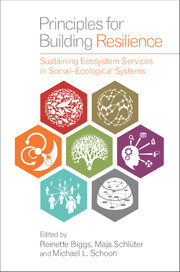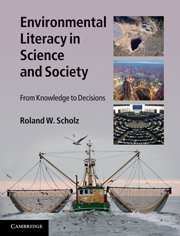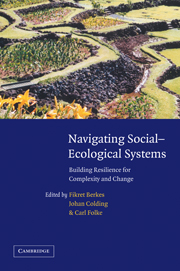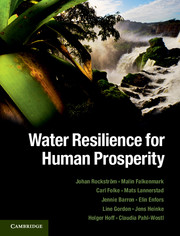Principles for Building Resilience
As both the societies and the world in which we live face increasingly rapid and turbulent changes, the concept of resilience has become an active and important research area. Reflecting the very latest research, this book provides a critical review of the ways in which resilience of social-ecological systems, and the ecosystem services they provide, can be enhanced. With contributions from leaders in the field, the chapters are structured around seven key principles for building resilience: maintain diversity and redundancy; manage connectivity; manage slow variables and feedbacks; foster complex adaptive systems thinking; encourage learning; broaden participation; and promote polycentric governance. The authors assess the evidence in support of these principles, discussing their practical application and outlining further research needs. Intended for researchers, practitioners and graduate students, this is an ideal resource for anyone working in resilience science and for those in the broader fields of sustainability science, environmental management and governance.
- Provides an introduction to key principles for building resilience in society and the environment, discussing their function and practical applications
- Synthesises insights from across the natural and social sciences, providing a comprehensive interdisciplinary overview and drawing on in-depth case studies
- Intended for researchers and graduate students in the environmental, governance and sustainability fields, as well as applied researchers and practitioners working at the science-policy interface
Reviews & endorsements
'Clear concepts, structure, and logic make this work a coherent and integrated multi-authored book. It is an essential read for those who care about the future of our planet.' Conservation Biology
'… carefully designed and edited … this work provides the best available overview and critical discussion of principles that could be used to strengthen the resilience of ecosystems.' Hanna Weise, The Quarterly Review of Biology
Product details
April 2015Hardback
9781107082656
311 pages
235 × 158 × 18 mm
0.63kg
42 b/w illus. 5 tables
Available
Table of Contents
- List of contributors
- Foreword Carl Folke
- Acknowledgements
- 1. An introduction to the resilience approach and principles to sustain ecosystem services in social-ecological systems Reinette (Oonsie) Biggs, Maja Schlüter and Michael L. Schoon
- 2. Politics and the resilience of ecosystem services Michael L. Schoon, Martin D. Robards, Katrina Brown, Nathan Engle, Chanda L. Meek and Reinette (Oonsie) Biggs
- 3. Principle 1: maintain diversity and redundancy Karen Kotschy, Reinette (Oonsie) Biggs, Tim Daw, Carl Folke and Paul West
- 4. Principle 2: manage connectivity Vasilis Dakos, Allyson Quinlan, Jacopo A. Baggio, Elena Bennett, Örjan Bodin and Shauna BurnSilver
- 5. Principle 3: manage slow variables and feedbacks Reinette (Oonsie) Biggs, Line Gordon, Ciara Raudsepp-Hearne, Maja Schlüter and Brian Walker
- 6. Principle 4: foster complex adaptive systems thinking Erin L. Bohensky, Louisa S. Evans, John M. Anderies, Duan Biggs and Christo Fabricius
- 7. Principle 5: encourage learning Georgina Cundill, Anne M. Leitch, Lisen Schultz, Derek Armitage and Garry Peterson
- 8. Principle 6: broaden participation Anne M. Leitch, Georgina Cundill, Lisen Schultz and Chanda L. Meek
- 9. Principle 7: promote polycentric governance systems Michael L. Schoon, Martin D. Robards, Chanda L. Meek and Victor Galaz
- 10. Reflections on building resilience: interactions among principles and implications for governance Maja Schlüter, Reinette (Oonsie) Biggs, Michael L. Schoon, Martin D. Robards and John M. Anderies
- Index.









